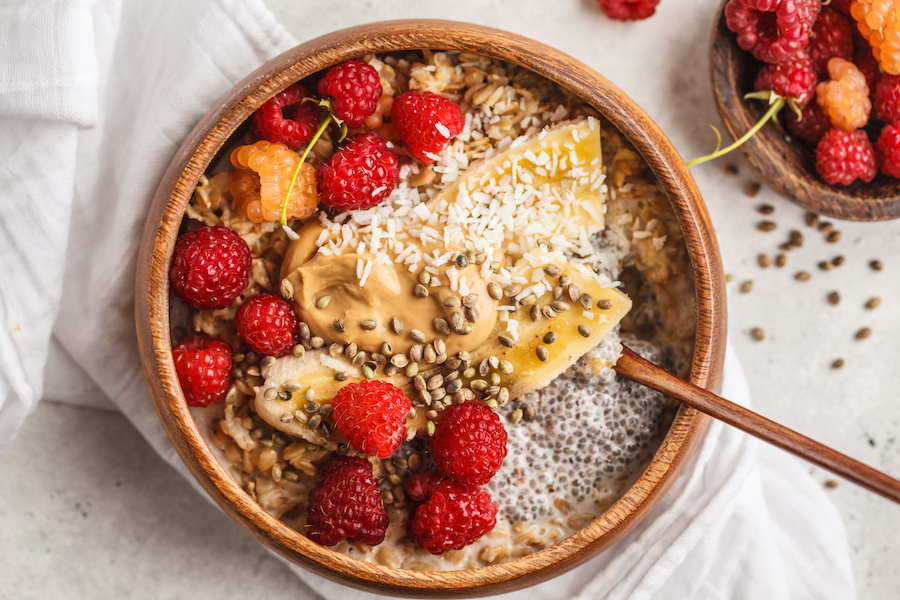
Super seeds: Power up with flax, hemp, & chia
Seeds might seem small, but they pack powerful nutritional punch as an integral part of a plant-based diet.*
Evidence shows that eating a plant-based diet—one rich in fruits, vegetables, beans/legumes, nuts/seeds, and whole grains—is associated with improved cardiovascular health, lower risk of diabetes, lower risk of certain cancers, and a healthier gut microbiome. But what is it that makes seeds so essentially good for us?
Seeds provide us with heart-healthy fats (omega-3 fatty acids), plant-based proteins—hemp seeds are one of the few plant foods that contain all 9 of the essential amino acids—and fiber, which is good for keeping our gut microbiome healthy and happy. They also provide us with vitamins and minerals including calcium, zinc, copper, phosphorus, and magnesium.
But why are omega-3 fatty acids so important? Because, unlike other fats, our bodies cannot make omega-3 fatty acids. They are called essential fatty acids, meaning we must get them from food. Omega-3 fatty acids are essential for making hormones that regulate inflammation, which has been shown to help prevent heart disease and help control eczema, rheumatoid arthritis, cancer, and other conditions.
It should be noted that omega-3 fatty acids from plant sources (in the form of alpha-linolenic acid) are different than the omega-3 fatty acids from seafood. There are a total of three different types of omega-3s: alpha- linolenic acids (ALA) from plant sources (like chia, flax, and hemp seeds); eicosapentaenoic acid (EPA) and docosahexaenoic acid (DHA) mainly from seafood. Therefore, consuming plant-based sources of omega-3 fatty acids should not necessarily replace omega-3s from seafood or fish oil supplements.
There’s minimal difference between golden and brown varieties of flaxseed. All forms (whole, ground, oil, etc.) of flaxseed can have health benefits, but ground flaxseed allows for better absorption of lignans and omega-3 fatty acids.
Baking at normal temperatures with whole or ground flaxseed does not destroy the beneficial properties of the seed, but do avoid heating flax oil.
How to eat/use seeds
Incorporating more of these seeds into your diet can be as easy as sprinkling a spoonful or two into smoothies or on top of yogurt, cereal, soups, and salads.
For a fast, dairy milk alternative, consider making hemp seed milk. Just as you would blend almonds and water to make almond milk, blend un-soaked hemp seeds with water to make hemp seed milk (recipes are widely available online).
Alternately, you can add hemp seeds to veggie burgers, dips or spreads like the recipe below.
Make jam or pudding with chia seeds or add to overnight oats. Try substituting ¼ cup of ground flaxseed with ¼ cup flour next time you make banana bread.
Like most things in life, remember that moderation is key. Keep your intake of these seeds to normal, reasonable amounts—2-3 tablespoons per day.
| Serving Size | Protein (gm) | Fiber (gm) | Omega-3 (mg) |
| Ground flax (2 Tbsp) | 3 | 3 | 2430 |
| Hemp (3 Tbsp) |
10 | 3 | 2090 |
| Chia (2 Tbsp) |
6 | 10 | 4280 |
How to store seeds
Contrary to popular belief, these seeds don’t have to be kept in the refrigerator. Store them in a cool, dry place.
Recipe for Hemp Pesto
Great for pasta, rice, cold salads or as a spread or dip.
1 cup packed fresh Basil leaves
½ cup hemp seed hearts
½ cup grated parmesan cheese
2 cloves garlic, minced
½ tsp salt
¼ cup olive oil
Combine basil, hemp seed, parmesan cheese, garlic and salt in a food processor or blender and begin pureeing. Slowly stream in olive oil and mix until a smooth paste has formed, about 2-3 minutes. Store in the refrigerator for up to 1 week.
*Following a plant-based doesn’t necessarily mean you have to lead a vegetarian or vegan lifestyle; rather, eating plant-based merely means that a majority of your food comes from minimally processed, whole plant foods. A good measure of this is with a plate where two-thirds to three-quarters are covered by fruits, vegetables, and/or whole grains and the remainder with meat, seafood, dairy, or eggs.
 Amanda Li is a registered dietitian nutritionist and certified nutrition support clinician who works in the Radiation Oncology clinic at the University of Washington Medical Center. Outside of work, she enjoys rock climbing, gardening, cooking, playing board games, and spending time with her dog, Hula.
Amanda Li is a registered dietitian nutritionist and certified nutrition support clinician who works in the Radiation Oncology clinic at the University of Washington Medical Center. Outside of work, she enjoys rock climbing, gardening, cooking, playing board games, and spending time with her dog, Hula.